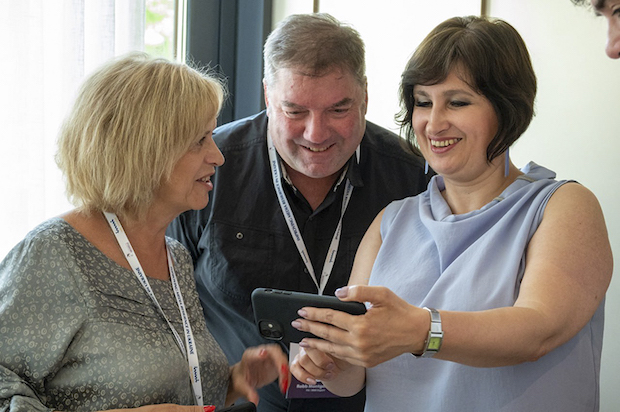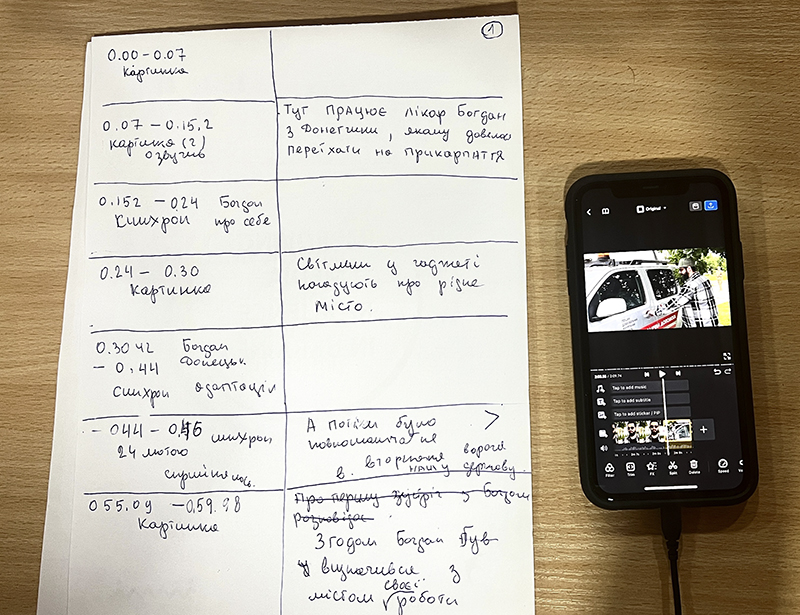
"You don't have to go to the frontlines to find great stories," says Robb Montgomery, an experienced mobile journalism trainer and filmmaker, upon returning from Ukraine.
Last month, he spent two weeks in two Ukrainian cities, Ivano-Frankivsk and Odesa, training 18 newspaper journalists how to plan, shoot and edit mobile journalism stories. The project - "Improving Media Resilience in Ukraine Project" - was led by Fondation Hirondelle, a Swiss non-profit organisation funded by Swiss Solidarity.
The goal was for each participant to produce a two-to-three-minute short, interview-driven film showing how internally displaced people (IDPs) are rising up to their challenging circumstances.
Journalists and local people alike have had to relocate from their hometowns.

Local fixers helped to find good story subjects, like the neurosurgeon working at an underground clinic performing complex procedures on soldiers and even their own parents.
"There are so many storylines in Ukraine, one of which is this idea of social cohesion," says Montgomery, speaking on the Journalism.co.uk podcast.
"You’ve got journalists who are part of these displaced communities. This has a psychological and community effect, and that has so many ramifications.
"One of the goals of this training is to empower journalists to share those stories and smartphones just democratise that. It's great because everyone has the technology in their pockets, but they don’t necessarily have the language or skillset."
Indeed, this was a new learning curve for established newspaper journalists, getting to grips with new equipment. The foundation worked with a local partner, IRMI, to provide gear such as iPhones, microphones, lights, tripods, backpacks and grips. Montgomery himself had to smuggle 18 face lights in his carry-on luggage during his three-day journey to Ukraine.
But it was pen and paper that proved an unlikely challenge. The temptation with mobile editing is to dump all the clips in the video editor and wade through the process. But that wastes a lot of time and can lead to mistakes.
Montgomery teaches an analogue process, where reporters need to write down all of their shots, time codes, soundbites, facts and moments to generate an approved script. Then the editing can begin. Long interviews result in a longer edit, as the journalists learned the hard way.

"I said to them: 'You’re already at the top of the mountain for newspaper reporting, you need to get to the top of the mountain for filmmaking - but there’s no cable car that will take you from one peak to the other. You have to be willing to climb down and climb up'," he recalls.
"Anyone who has made good videos has gone through that process."
Montgomery is seeking to return to the country but lacks funding. He estimates that there could be another 100 journalists to train before the end of the year.
Join Robb Montgomery's online, six-week mobile journalism masterclass.
Free daily newsletter
If you like our news and feature articles, you can sign up to receive our free daily (Mon-Fri) email newsletter (mobile friendly).
Related articles
- Delivering news during the war: reflections on EBU's visit to Ukraine
- New project InOldNews wants to improve representation in video journalism
- 38 mojo apps from BBC trainer Marc Blank-Settle
- Kyiv Independent launches an English-speaking journalism school
- Meet the inspiring, disabled journalists working their dream jobs









